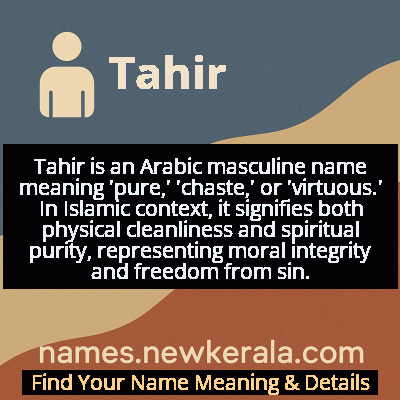Tahir Name Meaning & Details
Origin, Popularity, Numerology Analysis & Name Meaning of Tahir
Discover the origin, meaning, and cultural significance of the name TAHIR. Delve into its historical roots and explore the lasting impact it has had on communities and traditions.
Name
Tahir
Gender
Male
Origin
Muslim
Lucky Number
2
Meaning of the Name - Tahir
Tahir is an Arabic masculine name meaning 'pure,' 'chaste,' or 'virtuous.' In Islamic context, it signifies both physical cleanliness and spiritual purity, representing moral integrity and freedom from sin.
Tahir - Complete Numerology Analysis
Your Numerology Number
Based on Pythagorean Numerology System
Ruling Planet
Moon
Positive Nature
Diplomatic, friendly, artistic, empathetic.
Negative Traits
Over-sensitive, moody, indecisive, prone to self-pity.
Lucky Colours
Green, cream, white.
Lucky Days
Monday.
Lucky Stones
Pearl, moonstone.
Harmony Numbers
1, 3, 4.
Best Suited Professions
Diplomats, mediators, caregivers, artists.
What People Like About You
Cooperative spirit, friendliness, artistic talent.
Famous People Named Tahir
Tahir-ul-Qadri
Islamic scholar and politician
Founded Minhaj-ul-Quran International and authored hundreds of books on Islamic jurisprudence
Tahir Shah
Author and filmmaker
Renowned for travel writing and documentary films exploring cultural intersections
Tahir Mahmood
Legal scholar
Expert in Islamic law and comparative jurisprudence, served on numerous legal reform committees
Tahir Gora
Writer and journalist
Prominent Pakistani-Canadian writer advocating for secular values and free speech
Name Variations & International Equivalents
Click on blue names to explore their detailed meanings. Gray names with will be available soon.
Cultural & Historical Significance
Historically, the name gained prominence through notable figures like Tahir ibn Husayn, who founded the Tahirid dynasty in 9th-century Persia, demonstrating how the virtue of purity was associated with leadership and governance. Throughout Islamic history, the name has been favored by scholars, mystics, and leaders who sought to embody the ideal of moral and spiritual cleanliness that the name represents. The enduring popularity of the name across diverse Muslim communities reflects its deep-rooted connection to Islamic ethical teachings and spiritual aspirations.
Extended Personality Analysis
Individuals named Tahir are often perceived as possessing a strong moral compass and inherent dignity. They tend to be principled, honest, and straightforward in their dealings, with a natural inclination toward truthfulness and transparency. Their 'purity' of character typically manifests as reliability and trustworthiness, making them valued friends and colleagues. Tahirs often exhibit a calm, composed demeanor and prefer clarity in communication and relationships, avoiding deception or hidden agendas.
They may be drawn to professions or activities that allow them to maintain their integrity and work toward noble causes. While sometimes perceived as reserved or serious, this often stems from their thoughtful nature and commitment to living according to their values rather than from aloofness. Their strength of character often makes them natural leaders who inspire confidence through their consistency and moral clarity. The name's meaning seems to create an expectation of ethical behavior that many Tahirs consciously or unconsciously strive to fulfill throughout their lives.
Modern Usage & Popularity
Tahir remains a popular name in Muslim communities worldwide, particularly in South Asia, the Middle East, and among Muslim diaspora communities in Europe and North America. While it maintains its traditional religious significance, contemporary usage also reflects its appeal as a strong, dignified name with positive connotations. The name has seen consistent usage rather than dramatic popularity spikes, indicating its enduring appeal across generations. In recent years, it has gained some visibility in Western contexts through prominent individuals in academia, arts, and sports, helping to familiarize the name in multicultural settings. Its straightforward pronunciation and positive meaning contribute to its continued relevance, making it a timeless choice that bridges traditional values with modern sensibilities.
Symbolic & Spiritual Meanings
Symbolically, Tahir represents the human aspiration toward moral and spiritual perfection. It embodies the ideal of being untainted by negative influences, corruption, or immoral behavior. The name carries connotations of clarity, transparency, and authenticity - suggesting someone whose inner state matches their outward appearance. In a metaphorical sense, Tahir symbolizes the journey of self-purification and the continuous effort to maintain integrity in a complex world. It represents the Islamic concept of fitrah - the innate human disposition toward goodness and recognition of truth. The name also carries associations with renewal and cleansing, much like pure water that washes away impurities, suggesting both the process and the state of being purified, making it a powerful symbolic representation of ethical and spiritual ideals.

